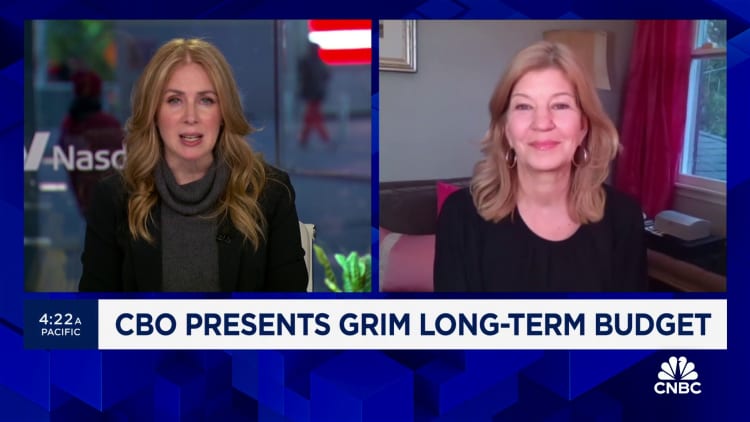South_agency | E+ | Getty Images
House Republicans unveiled a plan this week that calls for raising the Social Security retirement age. Meanwhile, Democrats and advocates for the program are ramping up their calls to tax the rich to enhance benefits.
“On the right, there is a line in the sand against tax increases,” said Emerson Sprick, associate director of economic policy at the Bipartisan Policy Center.
“And on the left, there’s this idea that we’re going to address this problem and not touch benefits,” he said.
Both Social Security and Medicare face looming insolvency dates, while the number of seniors who rely on those programs is projected to grow.
More from Personal Finance:
Millionaires may have hit their 2024 Social Security payroll tax limit
78% of near-retirees failed or barely passed a Social Security quiz
Many Americans believe pensions are key to the American Dream
The trust funds that Social Security relies on to pay benefits may run out in the next decade. For retirees, that may amount to a 23% benefit cut. For the average dual-income couple, that would result in a $17,400 benefit cut, the Committee for a Responsible Federal Budget has estimated.
Medicare’s hospital insurance trust fund, which covers Medicare Part A, may face insolvency in 2031.
Meanwhile, the Congressional Budget Office is now projecting public debt will grow to 166% of gross domestic product by 2054, up from about 97% as of fiscal year 2023.

This week, the Republican Study Committee, a large group of conservative House Republicans, released a 2025 budget proposal including significant reforms for Social Security and Medicare.
President Joe Biden, in his own recent budget proposal, also outlined broad changes he hopes can be made to those programs.
Changes that are enacted to Social Security and Medicare will have to be bipartisan.
“Any kind of durable policy with a realistic chance of getting through Congress is going to have to include aspects from both of these budgets,” Sprick said.
Republican budget calls for raising retirement age
The Republican Study Committee budget calls for “Making Social Security Solvent Again.”
The reforms would be gradually phased in and “affect no senior in or near retirement,” according to the plan. Ultimately, the goal for the changes is to make Social Security’s retirement trust fund “sustainably solvent.”
Republicans’ budget proposal calls for “modest adjustments” to the retirement age to reflect longer life expectancies, though it did not specify how high the age could go up. Social Security’s full retirement age — when beneficiaries may receive 100% of the benefits they’ve earned — is currently 67 for people born in 1960 or later.
The plan also calls for reducing full retirement age benefits for high-income earners, while also limiting and phasing out “auxiliary benefits” for those beneficiaries’ spouses and dependents. The budget did not specify the income thresholds to which those changes would apply.
“There is a lot of willingness and openness on the Republican side of the aisle to reduce Social Security benefits for high earners,” Sprick said.
The Republican budget proposal would restructure Medicare so beneficiaries receive premium support subsidies, which they may use to pay for either through federal traditional Medicare or private Medicare Advantage plans. The amount of the subsidies would be based on a benchmark that would be chosen after testing several options, according to the plan.
Biden’s proposal opposes benefit cuts
Biden’s budget outlines the ways in which the president wants to address the looming funding shortages both Social Security and Medicare currently face.
“No benefit cuts,” the budget states regarding Social Security. Efforts to privatize the program are also off the table.
To help shore up Social Security’s shortfall, Biden’s budget calls for the “highest-income Americans to pay their fair share.”
“Under my plan nobody earning less than $400,000 will pay an additional penny in federal taxes,” Biden said during his State of the Union address earlier this month.
The president’s budget proposal also calls for improving Social Security and Supplemental Security Income benefits for retirees and individuals with disabilities who “face the greatest challenges making ends meet.”
Biden’s budget also aims to shore up Medicare in keeping with changes he has previously proposed. That includes raising the Medicare tax rate on both earned and unearned income from 3.8% to 5% for those earning more than $400,000.
Parties trade jabs on proposals
Biden’s plan stops short of specifying how he would restore Social Security’s solvency with the proposed combination of tax increases and benefit enhancements. That has prompted House Republicans in their budget proposal to state, “President Biden’s plan would cut benefits by 23% in 2033” in reference to the program’s current projected depletion date.
“We could extend the life of Medicare’s Trust Fund permanently — without cutting benefits — if Congressional Republicans would get on board with the President’s historic budget proposal to raise taxes on the wealthy,” White House spokesperson Robyn Patterson said in a statement. “The President’s Budget also clearly states his principles for strengthening Social Security.”
Democrats, on the other hand, have complained the Republican budget proposal would result in $1.5 trillion in benefit cuts, including raising the retirement age.
“Because they know these cuts are unpopular with the American people, the [Republican Study Committee] does not reveal how many years they would raise the age nor how they would ‘phase out’ other benefits,” Rep. John Larson, D-Conn., ranking member of the House Ways and Means Social Security Subcommittee, said in a statement.

